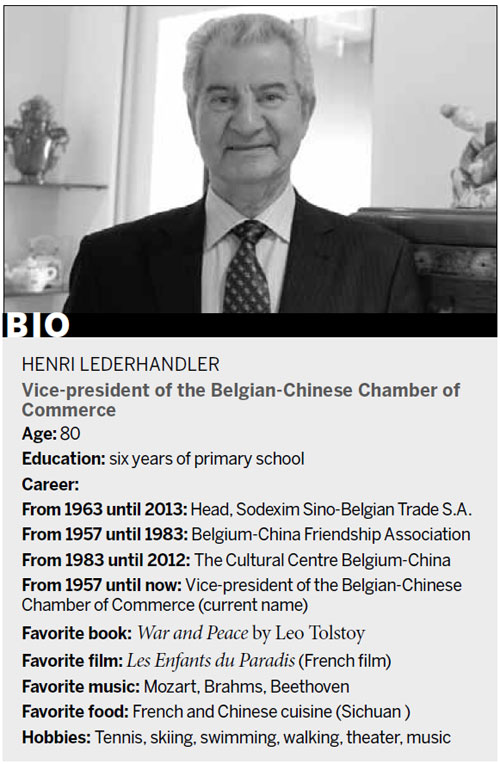Keen satisfaction in improbable life of Belgian

Retirement has given 80-year-old entrepreneur Henri Lederhandler a new lease of life and a new avenue toward developing Sino-Belgian relations.
When he stepped down as head of an agency exporting steel, chemicals and heavy machinery to China, he began writing his own story, involving more than half a century of trade and cultural relations with China.
Now he is busier than ever in responding to public interest in the resulting book.
"In the coming month, I will give six lectures in Brussels, all about my book," says Lederhandler, who is also vice-president of the Belgian-Chinese Chamber of Commerce.
Un Parcours Improbable (An Improbable Journey), published earlier this year, covers meetings with later leaders Mao Zedong and Zhou Enlai in the 1950s and 60s, to those with present-day leaders. Such is Lederhandler's standing in China that in May last year, the now premier, Li Keqiang, visited his home and family in Brussels to thank him for his pioneering contribution to bilateral trade and economic relations.
He finished the book with French language professor and China expert Serge Pairoux. The Chinese version of the biography will be published this month.
"I only had six years of education and I am not good at French literature," the self-made businessman says, sitting in the sofa of his spacious and Chinese-decorated living room, and much happier in talking rather than writing.
"At the upcoming lectures, I will speak about my life, which is the beginning of the book, and then I will come back to the stories with China." he says. "The main part of the book is about my experiences with China, within its business and political circles."
Bernard Dewit, chairman of the Belgian-Chinese Chamber of Commerce, says Lederhandler's book is a message of hope for people of humble origins who wish to succeed.
"Lederhandler's life has been, for a great part, dedicated to the improvement of business and political relations between China and the Western world," Dewit says. "We have to listen to his voice at a time when some groups are advocating a closing of the borders."
The twists of fate at the beginning of his life's journey are as improbable as those leading to China.
Lederhandler was born in 1933, one of four children of a Jewish Polish family who had moved to Brussels 12 years earlier. His father, a miner, died in a concentration camp but, thanks to a Belgian woman, who hid Jewish children from the Nazis in a remote area near the French border, he and his brother escaped the Holocaust.
Following the war, aged 14, he worked for a leather company before joining the army for two years.
Lederhandler then joined the Belgium Young Communist League, becoming responsible for international liaison, where Lederhandler was first invited to visit China in 1957 as part of a 10-member political delegation. That was when he met premier Zhou Enlai.
In 1963, Lederhandler started an import-export business with China and, in the same year, met Chairman Mao.
In all that has happened and changed in China over the past 50 years, the Belgian has remained close to its leaders, people and events, having visited his "second motherland" more than 70 times.
In his book, he tells why China could only start to reform and open up in 1978, which he describes as "an earthquake", transforming the country's economic and social landscape. That was the year China and the United States made huge progress in bilateral relations.
"From my point of view, the recognition of the People's Republic of China by the US was a very important element, explaining why Deng Xiaoping could start this new policy.
"Domestically, China put an end to the chaos of 'cultural revolution' (1966-1976) and, externally, ties with the US improved. But it didn't happen overnight. It was a gradual process.
"Thirty years in terms of history is not long, but China has made unbelievable progress."
Most impressive, says the Marxist-Darwinist Lederhandler, is the lifting of 400 to 500 million out of poverty.
However, he claims such progress is still not well reflected in the Western media.
"Until recently, the Western media hasn't given objective coverage about what happens in China. Some of them only say bad things and cover problems of this fast-evolving country, which is a pity."
Lederhandler says this biased reporting is one of the main reasons why he remains active in giving Westerners a proper picture of China.
"As a long-time witness of China's development, I have a huge responsibility to do so," he says.
Lederhandler, who helped found the Belgium-China Friendship Association in 1957, says he must also acknowledge mistakes China has made in its development. "I must do this; like mentioning good things and bad things, yin and yang. If I don't, I am not honest."
Li Xiaofei contributed to the story.
- Belgian, British scientists share 2013 Nobel Prize in Physics
- Huawei refutes false allegations in Belgian press
- Premier Li meets European leaders
- Belgian PM 'confident' in China's economy
- Chinese firm to buy stake in Belgian port operator
- State-owned shipping firm to buy stake in Belgian port operator
- Belgian firm encouraged by China's eco-consciousness

























